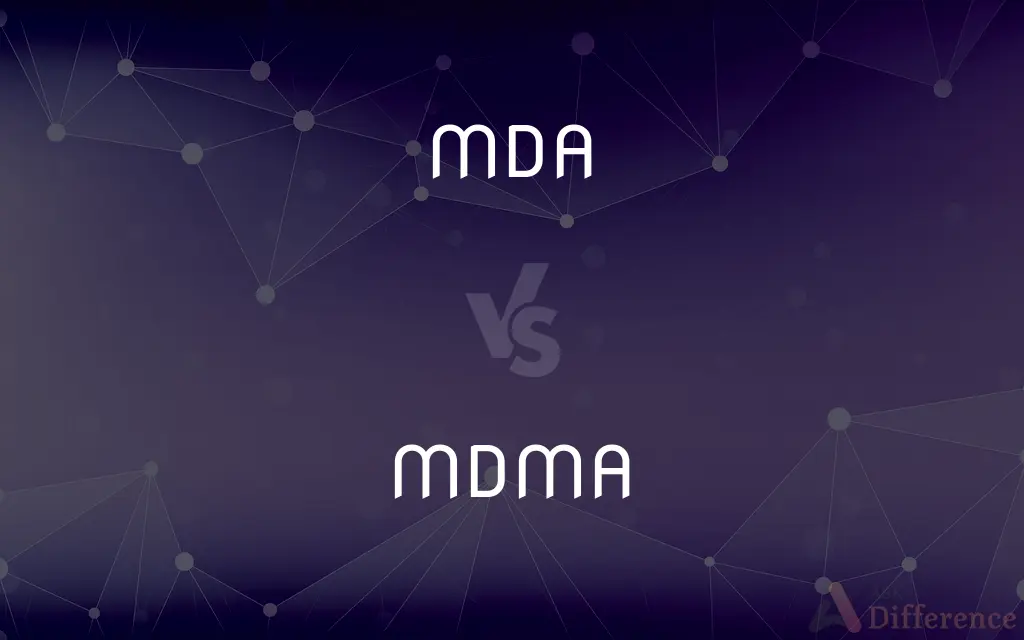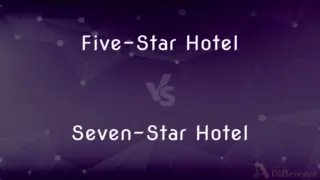MDA vs. MDMA — What's the Difference?
By Tayyaba Rehman — Published on January 24, 2024
MDA (3,4-Methylenedioxyamphetamine) is a psychoactive drug known for its stimulant and hallucinogenic effects, while MDMA (3,4-Methylenedioxymethamphetamine) is a similar compound, more famous for its use in ecstasy, noted for inducing feelings.

Difference Between MDA and MDMA
Table of Contents
ADVERTISEMENT
Key Differences
Chemical Structure and Effects: Both MDA and MDMA are amphetamines with similar chemical structures, but MDA has a slightly simpler structure. MDMA is more widely recognized for its empathogenic effects, causing feelings of emotional closeness and euphoria. MDA is also known for its psychoactive effects but is more associated with hallucinogenic properties.
Historical and Medicinal Use: MDA was first synthesized in the early 20th century and has been explored for various therapeutic uses. MDMA, developed later, gained attention for its potential in psychotherapy, especially for treating PTSD and facilitating therapy sessions, although its therapeutic use is still controversial and limited.
Illicit Use and Legal Status: Both MDA and MDMA are classified as Schedule I substances in the United States, indicating a high potential for abuse and no accepted medical use. MDMA, particularly in its street form known as ecstasy or molly, is more commonly encountered in the club scene and rave culture.
Physical and Psychological Effects: The effects of MDA can include enhanced sensory perception and hallucinations, while MDMA is more known for its mood-lifting and empathy-enhancing effects. Both can cause adverse effects like neurotoxicity, cardiovascular issues, and potential for addiction.
Duration of Effects: The effects of MDA tend to last slightly longer than those of MDMA, with MDA having a duration of about 6-8 hours, while the effects of MDMA typically last around 3-6 hours.
ADVERTISEMENT
Comparison Chart
Chemical Structure
Simpler amphetamine structure
Slightly more complex amphetamine structure
Primary Effects
Hallucinogenic and stimulant
Empathogenic, euphoria-inducing
Therapeutic Use
Explored for various therapies
Noted potential in PTSD treatment
Illicit Use
Less common than MDMA
Common in rave culture as ecstasy or molly
Duration of Effects
Approximately 6-8 hours
Around 3-6 hours
Compare with Definitions
MDA
The subjective experience of taking MDA.
His MDA experience was intense and included visual hallucinations.
MDMA
A popular psychoactive drug known for inducing euphoria and sociability.
MDMA is often used recreationally in dance clubs.
MDA
The chemical structure of MDA.
The MDA compound is a derivative of amphetamine.
MDMA
The emotional and psychological impact of MDMA.
The MDMA effects include feelings of happiness and connection with others.
MDA
The act of consuming MDA.
MDA use is illegal and can have serious side effects.
MDMA
The overall experience of someone under the influence of MDMA.
Her MDMA experience was described as euphoric and bonding.
MDA
A psychoactive drug with hallucinogenic and stimulant properties.
MDA was known to be used in psychotherapy in the past.
MDMA
The molecular makeup of MDMA.
The MDMA compound is similar to both amphetamine and mescaline.
MDA
The impact of MDA on mood and perception.
The MDA effects included enhanced colors and auditory sensations.
MDMA
The consumption of MDMA, particularly in social settings.
MDMA use is prevalent in the party scene.
MDMA
A drug, C11H15NO2, that is chemically related to amphetamine and mescaline and was formerly used in psychotherapy but is now illegal. It is used illicitly for its ability to induce euphoria, relaxation, and heightened empathy.
MDMA
Methylenedioxymethamphetamine, a drug designed to have the effects of amphetamines but originally synthesized to avoid the drug laws; it is now a controlled substance. It is informally called ecstasy. It is used by some abusively and illegally without a prescription.
MDMA
A stimulant drug that is chemically related to mescaline and amphetamine and is used illicitly for its euphoric and hallucinogenic effects; it was formerly used in psychotherapy but in 1985 it was declared illegal in the United States;
MDMA is often used at parties because it enables party-goers to remain active for long periods of time
Common Curiosities
Are MDA and MDMA legal?
Both are classified as Schedule I substances in the U.S., making them illegal for recreational use.
What are common side effects of MDA?
Side effects can include neurotoxicity, altered sensory perception, and potential addiction.
Is MDA used in the party scene?
MDA is less common than MDMA but can still be encountered in party settings.
Is MDMA addictive?
While MDMA can be habit-forming, its addictive potential is generally considered lower than that of traditional stimulants.
Can MDA and MDMA be used for therapy?
While there has been historical interest, their therapeutic use is limited and controversial.
How long do the effects of MDA last?
The effects of MDA typically last about 6-8 hours.
Why is MDMA popular at raves and clubs?
Its mood-lifting and social-enhancing effects make it popular in these environments.
What is MDA primarily known for?
MDA is known for its psychoactive effects, including hallucinations and stimulant properties.
What distinguishes MDMA?
MDMA is distinguished by its empathogenic effects, promoting feelings of euphoria and emotional closeness.
What are common side effects of MDMA?
MDMA can cause dehydration, overheating, and serotonin syndrome, among other risks.
What is the duration of MDMA's effects?
MDMA effects usually last around 3-6 hours.
Can MDA cause hallucinations?
Yes, MDA is known for its hallucinogenic properties.
What is the street name for MDMA?
MDMA is commonly known as ecstasy or molly in its street form.
How do MDA and MDMA affect the brain?
Both drugs interact with the brain's serotonin system, but in slightly different ways.
Are MDA and MDMA the same?
No, they are chemically similar but distinct substances with different effects and potencies.
Share Your Discovery

Previous Comparison
Five-Star Hotel vs. Seven-Star Hotel
Next Comparison
WWI vs. WWIIAuthor Spotlight
Written by
Tayyaba RehmanTayyaba Rehman is a distinguished writer, currently serving as a primary contributor to askdifference.com. As a researcher in semantics and etymology, Tayyaba's passion for the complexity of languages and their distinctions has found a perfect home on the platform. Tayyaba delves into the intricacies of language, distinguishing between commonly confused words and phrases, thereby providing clarity for readers worldwide.














































